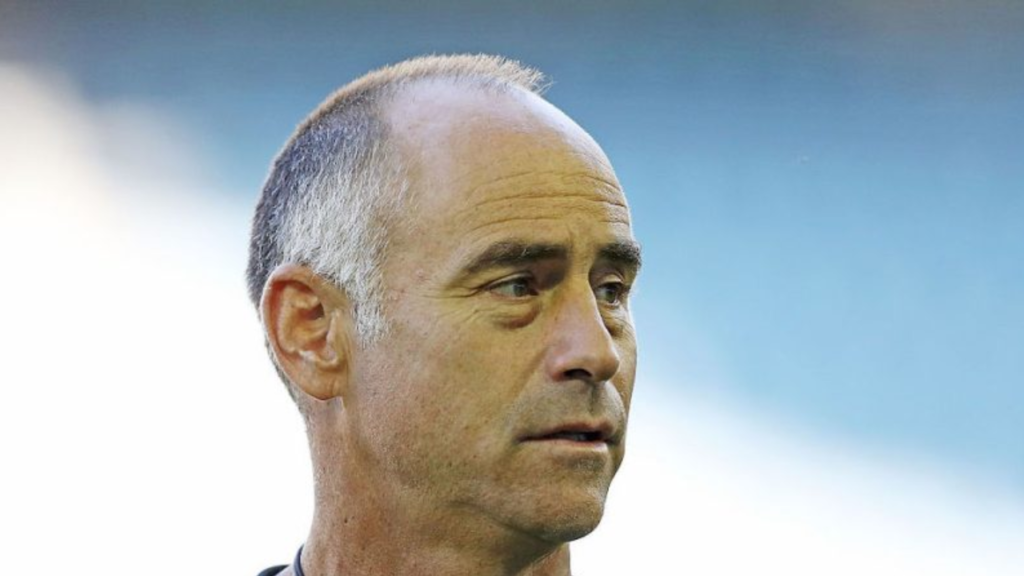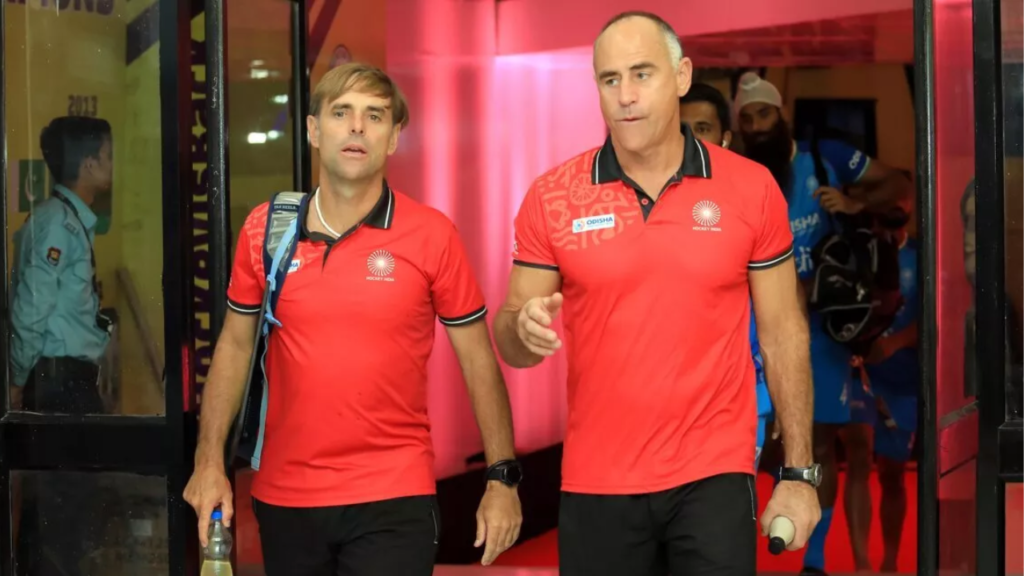
Part of Gary Kirsten’s support staff when India won the 2011 World Cup, Paddy Upton has been part of the Indian sports ecosystem in various ways for over a decade. Currently a mental conditioning coach with the hockey team ahead of the Paris Olympics, Upton spoke to Boria Majumdar, RevSportz editor-in-chief, about the unique pressures that Indian athletes have to face and how they can win the battle of the mind.
Boria: Back home in Cape Town after being with the Indian team in Australia. The series did not go our way. Is there a mental issue? The country will want to see Tokyo repeated, if not bettered, in Paris because hockey is massive in our country. What are your first thoughts?
Paddy Upton: First of all, thank you very much for inviting me. The trip to Australia was for a five-match series, and it was part of the Olympic preparation. It was very specifically chosen by the coaches of those two teams because they felt they could learn something from the other in the Olympic journey. The fact that it didn’t go well and India lost 5-0 is obviously not a good result, but it’s not a huge cause for concern – not for myself, not for the coaches. Probably only for the fans, because the idea was to go there and try some different combinations. In hockey, unlike cricket, particularly on an Olympic journey like we’re on now, you don’t want to play all of your best players. You don’t want to show all of your main moves, you don’t want to show penalty-corner attacking moves. It’s a very fine balance the coach needs to play between playing the best team and playing inexperienced players to see how they shape up in this kind of game. Test ourselves, but also not show Australia everything that we have got to offer. Certainly, there are things we didn’t bring to the table in Australia, which we will in Paris. It was an important part of the learning journey, and the team is better off for it.
🚨 Paddy Upton Exclusive:
“Desperation to win causes pressure, fear of losing creates anxiety. Pressure and fear are two direct obstacles to success.”
Mental conditioning coach @PaddyUpton1, who played a key role in India winning the 2011 Cricket World Cup, deep dives into the… pic.twitter.com/iwRaaB70QM
— RevSportz (@RevSportz) April 18, 2024
Boria: Your specific work, Paddy? When I speak to the cricketers, whether it’s 2011 or beyond that, a lot of people have told me they have benefited from the inputs you have given. Can you talk specifically about the mental-conditioning work you’re doing with Harmanpreet and team?
Upton: That’s a very broad question, very nuanced, with a lot of answers. Number one, to create a winning, attacking, warrior, Indian-tiger-like mindset, for individuals and the team that also aligns and is unique to them and their personality. That mindset becomes particularly important when there are distractions – when things go against us, 3-1 down at half-time…when we get a card and go down to 10 players…that’s the time when everyone really needs to step up.
Another thing, as with every team I’ve worked with, is to try and find a higher purpose or a greater cause for which each individual and the team plays. That’s very beneficial when you’re under real pressure. It becomes easier to find a well of inspiration from within and focused on the task at hand.
I’m also a very big believer that sport is just one part of life. I want to create mentally focused, in-control athletes, but also help people become good human beings. That involves separating out who I am as a person, and what I do as a hockey player. The more we’re grounded in who I am as a person, then we’re not as attached to results. We want to win, but we’re not desperate. We don’t want to do badly, but we’re not terrified. Pressure and fear are two of the biggest mental obstacles to success, and that happens because an individual attaches their self-worth to success. I want to separate those out.
Boria: Craig Fulton and the players told me that ahead of the Asian Champions Trophy last year, the coach had given them situations, and they were prepared for such. So, Harmanpreet and the boys were like, look, we were geared for adversity and able to deliver. Someone like Abhinav Bindra tells us every day that the Olympic stage will be about pressure. The first step to dealing with it is acceptance. Only if we’re mindful and accept that pressure can we deal with it. If I take Tokyo, many of our athletes – badminton players, shooters…mostly shooters. Tremendous talent, but went there and did not do well because we were not able to deal with the pressure. If the Indian Olympic Association asked you to help out with these athletes, will you be there?
Upton: The answer is yes. I love helping people step up in those high-pressure, big moments. And almost always, the difference in performance at an Olympics doesn’t boil down to talent or preparation. It’s not about strategy or how good your coach is. It comes down to how well you manage yourself in those high-pressure moments. That means recognise that this is one of those moments. Then, can you remain focused on the task regardless of the size of the occasion? There’s this amazing statistic that came out of the 2012 Olympics. Of the British athletes, only 20 per cent of them achieved their season’s best. That clearly points to the size of the occasion getting 80 per cent of the athletes to fall away from even their season’s best.
Acceptance isn’t enough. It’s a start. What I believe deeply is that the more secure I am as a person, separate from my results, the less pressure and fear we will suffer. The reality, Boria, is that there is no such thing as pressure. It’s a concept we create inside our own mind as a result of our own thinking. One of the powerful and long-lasting ways to prevent fear from gripping us is to know that I’m okay, who I am as a person. I want to do well, but I’m not desperate.

Boria: Take a shooter. There are multiple World Cups, and one World Championship every year. They’re young people, and they’ll tell you that at a World Championship, if they fail, one month later, they’ll get another chance. But when I go to an Olympic Games, I know I won’t get another chance for four years and that gets to me. I’ve trained foru years for this platform and now, if I mess up here, I’m done for four years. The words “Olympic Games” is actually pressure. In such a situation, Paddy, how do these athletes get ahead?
Upton: It’s not the Olympics that’s the distraction, it’s the desperation to succeed or the fear of not succeeding. Both are a focus on results. That takes us away from the process I need to engage in to get those results. The shooters don’t have any moving parts around them or opponents they need to look at. They don’t have a ball they need to track. It’s them focusing on a target and they need to squeeze the trigger. My focus is inside me and it’s a very narrow locus of control. It leaves so much room for thoughts to come into my head, compared to a midfielder in hockey. While the ball is in play, they’re watching it, watching their opponents, they’re looking for space, watching their own players…there’s so much they’re paying attention to that it’s difficult to get a thought to come into the head. That’s why sports like shooting and archery may be like climbing up a mountain. There is so much time for thinking to happen and to distract someone. There’s a reason why we hear MS Dhoni, one of the best performers in the recent history of Indian sport, say time and time again that we focus on the process, not on the result. He’s talking about facing one ball at a time, responding to it on merit. And if I do that ball after ball, with my in-game situational awareness, I have the best possible chance of that result. The Olympics, because of the size of it, attaches athletes’ minds to gold or the podium. They fixate on that result in the future and it takes them out of the present moment. It’s because we can’t deal with the future. The mind doesn’t understand the difference between thought and reality. Life is a journey, living it moment to moment.
Boria: You mentioned Dhoni. You’ve worked with Virat Kohli. For the last 12 years, India don’t win ICC competitions. Something happens to the Indian team in semi-finals and finals. You’ve worked with these players. Have you been able to decode what’s gone wrong?
Upton: The one that would stand out …most athletes are younger people. Most young people the world over tend to be quite influenced by the world around them. What happens on social media…compliments, criticism, what the coach says, what the fans say. What they read in the media, what others are wearing, how they’re dressing and speaking. As we mature, we become less and less influenced by the outside and we start having our own compass to make decisions for ourselves. The Indians, because there is such fanaticism around sport, the external influence on Indian cricketers, hockey players and Olympians is so much greater compared to athletes from other nations. They have to work that much harder to be less influenced by the noise, the expectation. I’ve worked in 13 sports, and India tops it when it comes to athletes’ friends saying: ‘You have to do well’. Families say that to them. There’s no other country where athletes have their friends and family placing so much pressure on them to do well. It’s easier to fade out the noise of fans you don’t know. But family, sometimes even coaches and IPL owners come in and say you have to win. That external focus on results, the more a player takes that on, the more the pressure and the fear. What I would do with Indian athletes is to get them to become their own person and treat that noise like the music in a restaurant when you’re sitting with your partner having a conversation. An athlete needs to be paying attention to the game unfolding in front of them. We want the noise to be background noise we don’t focus on. That noise is loudest in an Indian context.